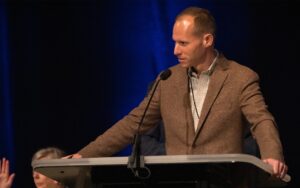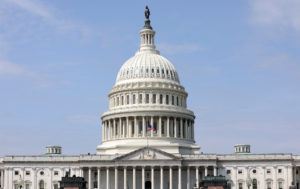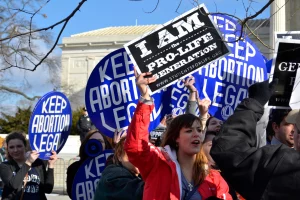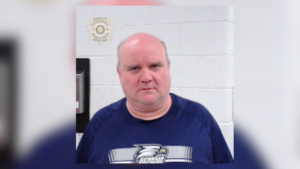
 Minutes after feeling the earthquake on December 26, Ibu Tetty was in her house in the small village of Desa Nusa, about ten kilometers from the coast in Indonesia's Aceh province.
Minutes after feeling the earthquake on December 26, Ibu Tetty was in her house in the small village of Desa Nusa, about ten kilometers from the coast in Indonesia's Aceh province.
She was giving thanks that her home was still standing.
"But then I saw the people running up the hill," she says, pointing at the slope rising nearby. "'Why are you running?' I asked them. "They were screaming, 'Water! Water! Run!' There was no time to get anything from the house."
The frightened villagers climbed on top of homes at the top of the hill. "When the water came, it was rolling and rolling," Tetty recalls, spinning her hands frantically. "'Oh, dear God!' I was crying. People were screaming and crying, 'Forgive us, God! Have mercy on us, God!'"
With tears in her eyes, she looks toward the ocean. "Alhamdulillah (thanks be to Allah), all of my family is OK."
The view from the ridge that saved Tetty's life — and the lives of her husband and six children — will never be the same. Framed by low mountains in the distance, the vista looking to the sea is one of complete desolation.
Similar scenes have greeted aid workers arriving in Banda Aceh, the devastated provincial capital. Once a city of more than 200,000, an accurate count of the dead there may never be known. In the wreckage of what was once a bustling port city, people walk through rubble in stunned silence.
Mixed into the debris are hundreds of bodies that may never be recovered. There are simply not enough people to dig out bodies.
"It's like a huge fist first smashed down hard on the whole area, and then a huge hand stirred it all up," said one aid worker, struggling to find words. Throughout the city, huge buses, trucks, and boats lie mangled and tossed about like toys. Shattered fishing boats lie in obscure resting places — atop bridges, along streets nowhere near water.
Nearly two weeks after the December 26 earthquake shook this city on the northern tip of Sumatra, the testament of its force remained: toppled minarets once reaching proudly to the sky, buildings collapsed on their foundations, deep cracks opened in the earth. But it was the ocean off the once-beautiful Sumatran coastline that destroyed the city — and still strikes fear in those who lived through the tsunami.
Like many survivors, Mr. Yusmanto escaped death only because he works outside Aceh. He doesn't understand why his house wasn't leveled in the tsunami. Still, having a frame of a house left doesn't make him lucky. Everyone else in his family is dead.
"Whatever they say the death toll is, in reality it is higher," he said. Sweeping an arm out to the rubble of his community, Yusmanto estimates as many as 30,000 died in the immediate area.
Intermittent stacks of corpses in body bags lined the road near his home. According to Yusmanto, many bodies recovered were pulled out by family members. But with entire families dead, "most bodies will stay here, because there is no one else to do it," he says.
All along the western coast of Aceh province, reports on the devastation continued to broaden the extent of the damage. Traveling by vehicle along the coast is impossible as dozens of bridges are gone.
Six hours south of Banda Aceh, the coastal town of Meulaboh — population 40,000 — has few survivors, early observers said.
"Between Meulaboh and Banda Aceh are many, many smaller coastal fishing villages and towns," says "Antonio," a Baptist worker assessing the needs in Aceh. "If Banda Aceh and Meulaboh are that completely destroyed, there's no doubt everything in between is also gone."
According to Antonio, conservative estimates say half the population of the city of Banda Aceh have been killed.
"After what we've seen, that really seems to be conservative," he says. "But it's not just here. It keeps going. It's everywhere. The devastation doesn't stop. I can't imagine how long it would be before anyone will feel good about settling back in some of these places. They will, but it will always be with the fear of more tsunamis."
Time to Focus on the Living
As people around the world continue to be inundated with images of the destruction, it's time to shift focus, says "Pat Julian" (name changed for security reasons), who coordinates Southern Baptist disaster relief in Asia.
"We need to get past the death toll and get focused on the living — because that's where our ministry is going to be," Julian says.
In Aceh, the area hit hardest by the tsunami, reconstruction will take years. As volunteers begin to arrive, Julian believes selfless acts of service will make the greatest impact.
"We need doctors and nurses and people with specific fields of expertise," he says. "But we need a lot more people who will do dirty work. It will be harder than you can imagine. There are so many needs – giving food and water to other volunteers; setting up water filtration systems; carrying sacks of rice; digging out debris and bagging badly decomposed corpses."
As one with established relationships with the people, Antonio says relief and aid delivered with humility and cultural sensitivity will have major impact.
"We've got an opportunity to reshape the people's perception of Christianity," he says. "They've got us categorized in just one box (together with all Westerners) …. We can reshape that."
Tsunami Relief: FAQ
What are Southern Baptists doing?
Initial efforts have focused on delivering food, water, medical supplies, and other essentials to survivors in heavily damaged coastal villages in southern Thailand and Malaysia. Assessment teams and trained disaster volunteers have arrived in — or are heading toward — Sri Lanka, Southeast Asia/Pacific Rim and other areas where more than 100,000 people have died from the December 26 earthquake and subsequent tsunamis.
What will Southern Baptists do long-term?
Meeting human needs as an extension of the hands of Christ means that the assistance needs to produce eternal repercussions, emphasized "Pat Julian" (name changed for security reasons), coordinator for Southern Baptist disaster relief in Asia. After the first wave of aid agencies has come and gone, it will be easier to see exactly what the true, lasting needs will be for the people and communities affected by tragedy, he said.
How do I volunteer at disaster sites?
In the early stages of relief, only volunteers already trained in disaster relief will be effective. If you qualify, contact your state Baptist disaster relief office. For contact information, visit www.namb.net.
After initial urgent needs are met, more volunteers, including individuals who haven't been trained in disaster relief, may be needed. Monitor those opportunities at imb.org/vim.
How do I give to help those hurt by the earthquake and tsunamis?
Online: Visit www.imb.org and click on "Give Now" to give using your MasterCard or Visa credit card.
By phone: Call 1-800-999-3113 between 8:30 a.m. and 5 p.m. Eastern time Monday through Friday to give using your MasterCard or Visa credit card. Have your card handy when you call.
Mail: Send checks to Asia Earthquake Disaster Relief, International Mission Board, P.O. Box 6767, Richmond, VA 23230.
Is my gift tax-deductible?
Yes. Whichever method you use to give, you will receive a receipt by mail for tax purposes.
Can I trust the International Mission Board to use my gift responsibly?
One hundred percent of what you give will be used to meet disaster needs. The International Mission Board is one of the few organizations who can make this claim – but only because Southern Baptists provide ongoing support through the Cooperative Program and the Lottie Moon Christmas Offering. That often means personnel are already in place who know the ropes — language, culture, and local infrastructure — to evaluate needs and design the best systems for meeting them. It also means the structure is already in place to publicize the needs, receive gifts, and channel them to where they're needed most.
How does the International Mission Board decide where to send relief funds?
Assessment teams with expertise in disaster relief visit areas to determine needs. They often work with local Baptist churches and other evangelical Christians in determining where help will do the greatest good — not just at the moment, but in the long run. Field personnel then request funding for specific projects. The IMB World Hunger and Relief Ministries office and Office of Overseas Operations evaluate each project by criteria designed to ensure effective and strategic response.
How were Southern Baptist missionaries affected?
Southern Baptist missionaries are safe and in place to minister to survivors.
How can I pray?
A worker in southern Asia asks you to pray for:
• God's consolation, peace, and mercy for those who have lost loved ones or cannot find their loved ones.
• protection and provision for those who have lost their belongings and are on the street.
• Christ to be seen through those sharing His love.
• Christians to make a great spiritual impact as they serve alongside people of other faiths.
• tensions among cultures to dissolve in the light of the greater need for understanding and mercy.
• relief workers to hold onto hope.
• government officials to accept offered help and resist temptation in the presence of money and resources.
• clean drinking water and Living Water.
• those in distress to call to the Lord.
How do I get updates?
Monitor Baptist Press (www.bpnews.net) and the International Mission Board (www.imb.org). Updates will be posted as they become available. Additional information also can be accessed at www.imb.org/pacrim and www.go2southasia.org.















